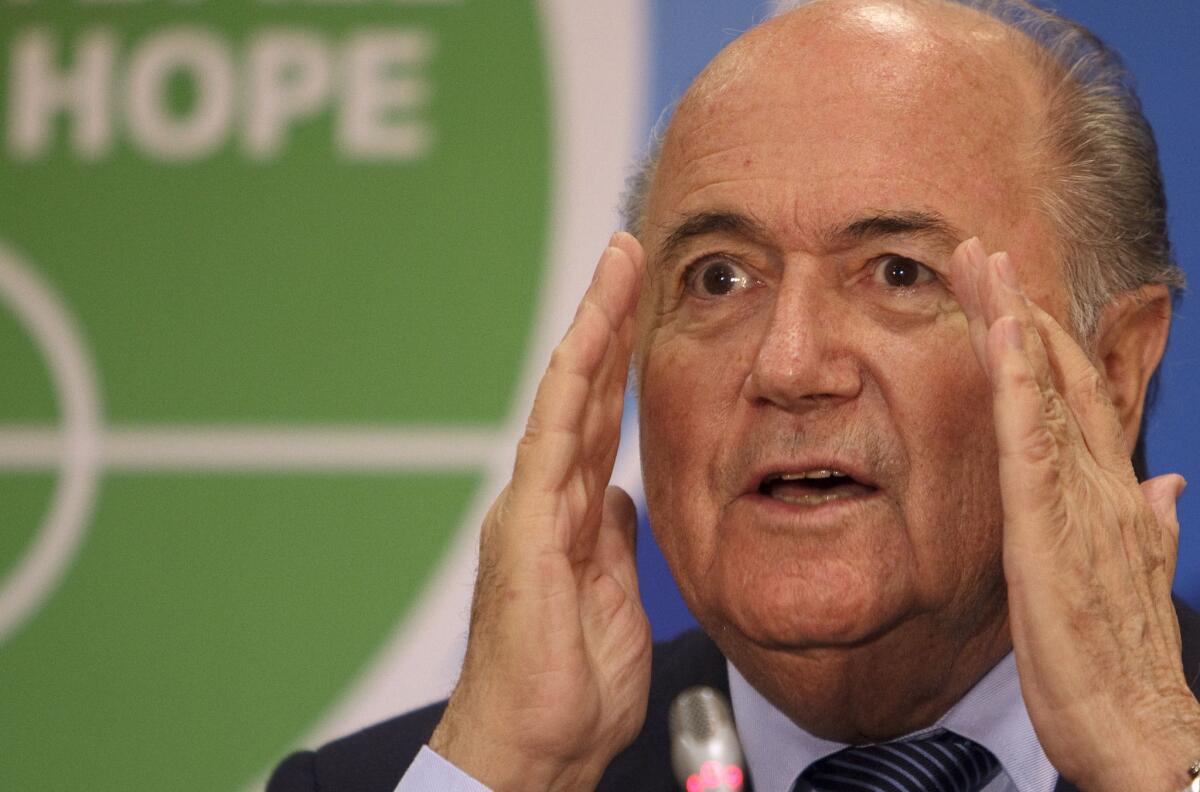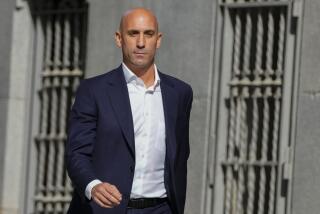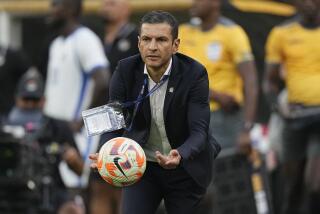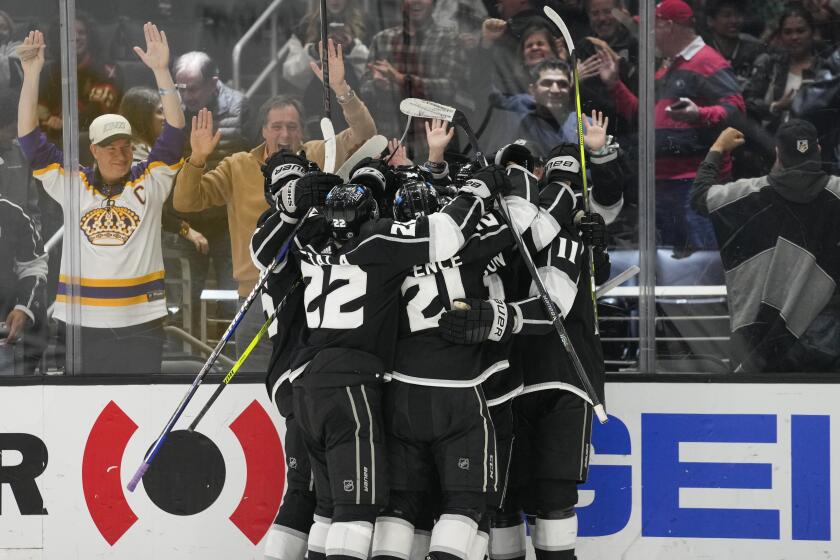Q&A: Is meaningful reform possible within FIFA?

Sepp Blatter’s resignation raises a lot of questions about the future of FIFA.
Sepp Blatter’s decision to resign as FIFA president four days after winning election to a fifth term as head of world soccer’s governing body is sure to produce a pitched battle to pick a replacement. But it also leaves several issues unresolved. Here are some of the questions that Tuesday’s surprise announcement raised:
What led to Blatter’s resignation?
It’s hard to say with any certainty. And Blatter himself wasn’t giving any reasons Tuesday. During his 17-plus years as FIFA president, Blatter has strongly and repeatedly dismissed charges of corruption within the organization and defiantly resisted calls that he step down for the good of the sport, saying after his reelection last week, “Why would I step down? That would mean I recognize that I did wrongdoing.” But a Deptartment of Justice investigation last week produced a 47-count indictment charging nine former and current FIFA executives with crimes, and a concurrent investigation into FIFA practices by Swiss authorities continues, a probe some reports say was drawing close to Blatter.
When will the election for a successor be held?
It won’t happen quickly. FIFA statutes require a four-month notice before presidential elections can be held. The organization also said it needs adequate time to vet candidates and allow them to present visions for their administrations. FIFA’s next annual congress is scheduled for May 2016 in Mexico City but Blatter said in his remarks Tuesday that a year is too long to wait, so expect FIFA to call a special election sometime between December 2015 and March 2016.
What will Blatter’s role be?
Blatter suggested Tuesday that, freed from the constraints of the presidency, he will “focus on driving far-reaching, fundamental reforms that transcend” previous efforts at reform -- efforts that, it must be noted, have been unsuccessful in the past largely because of Blatter’s intransigence. It seems disingenuous that Blatter now wants to lead that cleanup.
Is there a likely successor?
Several, in fact. Chief among them in UEFA President Michel Platini, who last week called for Blatter’s resignation, and Jordan’s Prince Ali bin al-Hussein, who drew enough support in last week’s election to deny Blatter a mandate. But after forcing a second round of balloting, Al-Hussein withdrew his candidacy. Other possible contenders include former Portuguese international player Luis Figo, who withdrew his name from the race for FIFA’s president just days before last week’s vote, and Greg Dyke, chairman of England’s Football Assn. and a fervent Blatter critic.
Who are the winners and losers?
It’s far too early to tell, but certainly the sport of soccer would seem to benefit, since Blatter’s decision opens the possibility of reform. Platini and Prince Ali are also winners since they look prescient in their calls for Blatter to be replaced. Losers could include Russian President Vladimir Putin, who came out in support of Blatter last week and blamed the troubles engulfing FIFA on the U.S. Also, Qatar’s plans to host the 2022 World Cup could also be in trouble, since the vote awarding the tournament to the small Middle Eastern monarchy was largely considered fraudulent.
Could the next two World Cups be moved?
It’s unlikely that FIFA, no matter who’s in charge, would risk a fight with Putin. And with the 2018 World Cup just two years away, there may not be enough time to relocate the event anyway. Qatar is a different story. That country’s World Cup preparations has already caused no end of headaches for FIFA, with international human rights organizations accusing the country of holding immigrant construction workers in slavelike conditions. Plus the country’s oppressive summer heat has forced the tournament to be moved from summer to fall for the first time in World Cup history. If the ongoing investigations prove Qatar did not win the right to host the tournament fairly, FIFA’s new leadership may have no choice but to pull the event, a decision many would welcome, with the U.S. and China heading the list of likely replacement sites.
Is this the end of the investigations?
Not by a long shot. The U.S. Justice Department and Swiss law enforcement say they are just getting started, so expect more indictments and more resignations in the coming weeks and months. Blatter may be the biggest man to fall but he’s by no means the last. The probes into possible criminal activity surrounding the 2018 and 2022 World Cup votes are likely to produce even bigger fireworks.
What role did FIFA’s corporate partners play in Blatter’s decision?
They may not have pushed Blatter but they certainly helped lead him to the edge. FIFA banked more than $5.7 billion in revenue over the last four years, much of it from sponsors such as Visa, Adidas, Coca-Cola, McDonald’s and Budweiser, who considered the scandal injurious to their carefully crafted public images. As a result, they threatened to take their business elsewhere if FIFA didn’t clean up its act. Blatter reportedly conferred with some partners last week, but it’s unlikely his words offered much reassurance, perhaps leading Blatter’s advisors to conclude a FIFA without him would be more profitable than one with him.
What role did the U.S. play?
The Department of Justice and the FBI played a huge role, with their indictments of high-ranking FIFA officials last week breaking open the scandal that led to Blatter’s resignation. Swiss authorities are also investigating FIFA and its connection to possible wrongdoing in the votes that to award the next two World Cups to Russia and Qatar. But U.S. Soccer and its president, Sunil Gulati, have been relatively quiet -- especially in comparison to Platini and Dyke, who were among the first to call for Blatter’s ouster. Hours after Blatter announced he was leaving, Gulati released a weakly worded statement in which he commended the decision, calling it a first step toward “real and meaningful reform.”
Is ‘meaningful reform’ possible?
Probably not in the short term. Bribery and corruption are so endemic in FIFA that even reformers like former CONCACAF president Jeffrey Webb have been charged with committing serious crimes. Plus kickbacks and favors that are illegal -- or at least unethical -- in the U.S. and many parts of Europe are often part of doing business in much of the developing world, home to many of FIFA’s 209 member federations. So rooting out every shady transaction is probably not possible. But FIFA can go a long way toward cleansing its image by bringing its most important decisions, such as choosing World Cup hosts, out into the open and becoming more transparent in even small, everyday decisions. A good start would the public release of a report by former U.S. Atty. Michael Garcia, whose 350-page investigation of the 2018 and 2022 World Cup votes was quashed by Blatter.
More to Read
Get our high school sports newsletter
Prep Rally is devoted to the SoCal high school sports experience, bringing you scores, stories and a behind-the-scenes look at what makes prep sports so popular.
You may occasionally receive promotional content from the Los Angeles Times.







